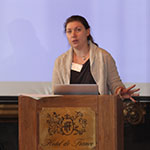Euroacademia Conferences
 Europe Inside-Out: Europe and Europeanness Exposed to Plural Observers (9th Edition) April 24 - 25, 2020
Europe Inside-Out: Europe and Europeanness Exposed to Plural Observers (9th Edition) April 24 - 25, 2020 Identities and Identifications: Politicized Uses of Collective Identities (9th Edition) June 12 - 13, 2020
Identities and Identifications: Politicized Uses of Collective Identities (9th Edition) June 12 - 13, 2020 8th Forum of Critical Studies: Asking Big Questions Again January 24 - 25, 2020
8th Forum of Critical Studies: Asking Big Questions Again January 24 - 25, 2020 Re-Inventing Eastern Europe (7th Edition) December 13 - 14, 2019
Re-Inventing Eastern Europe (7th Edition) December 13 - 14, 2019 The European Union and the Politicization of Europe (8th Edition) October 25 - 26, 2019
The European Union and the Politicization of Europe (8th Edition) October 25 - 26, 2019 Identities and Identifications: Politicized Uses of Collective Identities (8th Edition) June 28 - 29, 2019
Identities and Identifications: Politicized Uses of Collective Identities (8th Edition) June 28 - 29, 2019 The European Union and the Politicization of Europe (7th Edition) January 25 - 26, 2019
The European Union and the Politicization of Europe (7th Edition) January 25 - 26, 2019 7th Forum of Critical Studies: Asking Big Questions Again November 23 - 24, 2018
7th Forum of Critical Studies: Asking Big Questions Again November 23 - 24, 2018 Europe Inside-Out: Europe and Europeanness Exposed to Plural Observers (8th Edition) September 28 - 30, 2018
Europe Inside-Out: Europe and Europeanness Exposed to Plural Observers (8th Edition) September 28 - 30, 2018 Identities and Identifications: Politicized Uses of Collective Identities (7th Edition) June 14 - 15, 2018
Identities and Identifications: Politicized Uses of Collective Identities (7th Edition) June 14 - 15, 2018
Serbian Orthodox Church and the Challenge of Modernity, 1900-1945
-
-

-
Presentation speakers
- Maria Falina, Central European University, Budapest, Hungary
- Download presentation
Abstract:
The single characteristic most commonly associated with the Serbian Orthodox Church is its affinity for nationalism. The conventional understanding is that the two are intimately linked and inseparable. This link is normally presented as given and existent “since times immemorial” i.e. since the conversion to Christianity. However, this ‘link’ is to a great extent a creation of the late 19th c., and was contested already at the time. This paper analyzes the history of the relationship between the Serbian Church and nationalism from a fresh perspective and places it in the framework of ‘an encounter with modernity’.
I argue that the Serbian (and later interwar Yugoslav) as well as broader European political context was of great significance for the development of the Serbian Orthodox political project, which indeed in the shape that it acquired by the late 1930s was closely linked to nationalism. The political project of the Church, was essentially, defined by its reaction to challenges posed by political modernity: the creation of multinational and multi-religious Yugoslav state, ideology of Yugoslavism, fear of secularization, liberalism and capitalism, the rise of communism and fascism. The political sympathies of the Church were not static: while in 1918 the Church embraced and supported the new multinational Yugoslav state, in March 1941 the Patriarch and some important hierarchs supported the coup which eventually led to the dissolution of the state.In its attempt to cope with modernity the Serbian Church relied on a variety of resources, some of them of specific Orthodox theological nature, other of secular and non-native origins. By engaging with modernity, the Serbian Church often unconsciously and almost always unwillingly became part of it. Even the most anti-modernist, anti-democratic and anti-Western views of the Serbian Orthodox clerics are an inherent part of European twentieth century modernity.
-
Related Presentations

The Europeanization of Balkans: Yes or No!?
- Liljana Siljanovska

Outside the Stadium
- Michal Krajkowski
















